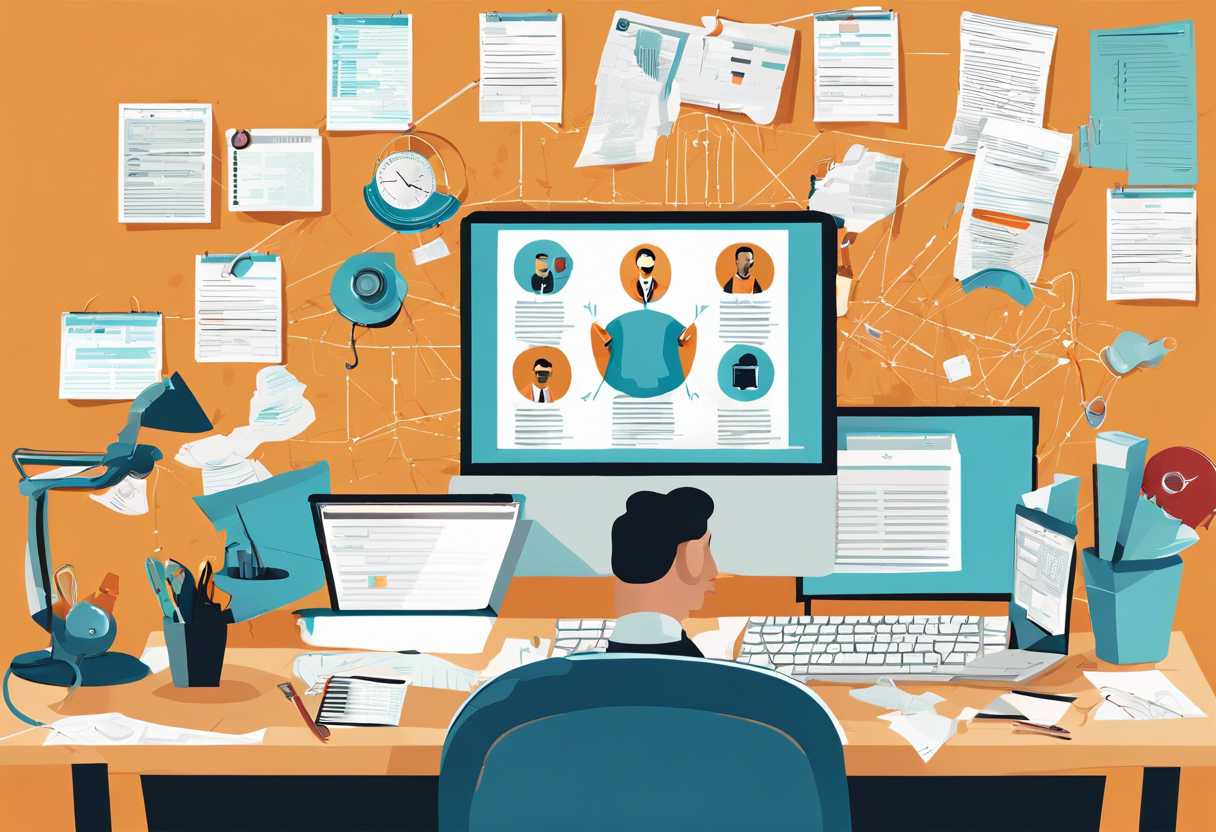Are you struggling to keep up with the demands of managing multiple projects simultaneously? In today’s fast-paced work environment, effective project management is crucial for ensuring productivity and success. In this blog post, we will explore the importance of prioritization and time management in managing multiple projects, as well as the benefits of utilizing project management tools for efficient task organization and collaboration. We will also discuss strategies for effective communication and coordination among project teams, the importance of balancing workload and setting realistic expectations for project deadlines, and how to overcome challenges and avoid burnout when juggling multiple projects. Whether you’re a project manager, team leader, or individual contributor, mastering the art of managing multiple projects is essential for achieving your professional goals. Let’s dive in and discover the most effective ways to tackle this common challenge in the workplace.
The Importance of Prioritization and Time Management in Managing Multiple Projects
Effective Prioritization
One of the key aspects of managing multiple projects is effective prioritization. This involves identifying the most important tasks and allocating time and resources accordingly. By prioritizing tasks, you can ensure that the most critical projects are given the attention they require, while less urgent tasks are managed in a way that does not compromise overall productivity.
Time Management Techniques
Time management is crucial when juggling multiple projects. Utilizing techniques such as the Pomodoro method, time blocking, and setting realistic deadlines can help you stay focused and organized. By breaking down your work into manageable chunks and allocating specific time slots to each project, you can maximize productivity and minimize the risk of feeling overwhelmed.
Benefits of Prioritization and Time Management
Implementing effective prioritization and time management strategies can lead to a range of benefits. These include reduced stress levels, improved productivity, and the ability to meet deadlines consistently. By staying organized and focused, you can also enhance the quality of your work and maintain a healthy work-life balance.

Utilizing Project Management Tools for Efficient Task Organization and Collaboration
The Importance of Project Management Tools
Project management tools are essential for efficient task organization and collaboration within a team. These tools provide a centralized platform for team members to track tasks, communicate, and share documents, ensuring that everyone is on the same page and working towards the same goals. By utilizing project management tools, teams can streamline their workflows, improve productivity, and ultimately achieve better results.
Key Features of Project Management Tools
Project management tools come with a variety of features that are designed to enhance task organization and collaboration. Some of the key features include:
- Task Tracking: Project management tools allow team members to create, assign, and track tasks, ensuring that everyone knows what needs to be done and by when.
- Communication Tools: These tools often include built-in communication features such as chat, comments, and notifications, enabling seamless collaboration and quick decision-making.
- Document Sharing: Project management tools provide a centralized location for storing and sharing documents, ensuring that team members have access to the latest information.
Best Practices for Using Project Management Tools
When utilizing project management tools for efficient task organization and collaboration, it’s important to follow best practices to maximize their effectiveness. Some best practices include:
- Establish clear processes: Define clear processes and workflows within the project management tool to ensure that tasks are organized and executed efficiently.
- Set clear expectations: Clearly communicate expectations and deadlines to team members to ensure that everyone is aligned and accountable.
- Regularly update and review: Regularly update the project management tool with progress and review tasks to ensure that everything is on track.

Strategies for Effective Communication and Coordination Among Project Teams
The Importance of Clear Communication
Clear communication is essential for the success of any project team. Without it, misunderstandings can arise, leading to delays, errors, and frustration. To ensure effective communication, team members should be encouraged to ask questions, seek clarification, and provide regular updates on their progress. Additionally, utilizing tools such as project management software, email, and video conferencing can help facilitate clear communication among team members, regardless of their location.
Establishing Clear Goals and Expectations
One of the most important strategies for effective coordination among project teams is to establish clear goals and expectations from the outset. This includes defining the scope of the project, outlining specific deliverables, and setting deadlines. By clearly communicating these goals and expectations to all team members, everyone will be on the same page and working towards a common objective. This can help prevent misunderstandings and ensure that everyone is aligned with the project’s overall vision.
Utilizing Collaborative Tools and Technologies
With the advancement of technology, there are now numerous collaborative tools and technologies available to help project teams communicate and coordinate more effectively. These tools can include project management software, file sharing platforms, and communication apps. By utilizing these tools, team members can easily share information, collaborate on documents, and stay connected, regardless of their physical location. This can help streamline communication and coordination, leading to improved productivity and efficiency.
Balancing Workload and Setting Realistic Expectations for Project Deadlines
Understanding Workload Management
Workload management is the process of effectively distributing and managing tasks and responsibilities within a team or organization. It involves assessing the available resources, prioritizing tasks, and setting realistic deadlines to ensure that projects are completed on time and within budget.
Effective workload management is crucial for maintaining productivity and preventing burnout among team members.
Setting Realistic Project Deadlines
Setting realistic project deadlines involves careful consideration of various factors, including the scope of the project, available resources, and potential obstacles. It’s important to avoid overcommitting and instead, set achievable deadlines that allow for unexpected delays or challenges.
By setting realistic project deadlines, teams can avoid the stress and pressure of constantly working against the clock, leading to better quality work and improved morale.
Strategies for Balancing Workload and Setting Realistic Expectations
- Conduct a thorough assessment of available resources and team capacity before committing to project deadlines.
- Communicate openly with team members about workload and deadlines, allowing for input and adjustments as needed.
- Utilize project management tools and software to track progress, identify potential bottlenecks, and make necessary adjustments to deadlines.
- Regularly review and reassess project deadlines based on changing circumstances or new information.
Overcoming Challenges and Avoiding Burnout When Juggling Multiple Projects
Setting Priorities and Managing Time Effectively
One of the biggest challenges when juggling multiple projects is managing time effectively. It’s crucial to set priorities and allocate time to each project based on its importance and deadlines. Using time management tools and techniques such as the Eisenhower Matrix can help you prioritize tasks and focus on what’s truly important. Additionally, consider using project management software to keep track of deadlines and milestones for each project.
Delegating and Collaborating with Others
Delegating tasks and collaborating with others can help lighten the load when juggling multiple projects. Identify tasks that can be delegated to team members or colleagues, and communicate effectively to ensure everyone is on the same page. Collaboration tools such as Slack or Microsoft Teams can facilitate communication and collaboration, making it easier to work on multiple projects simultaneously.
Practicing Self-Care and Avoiding Burnout
When juggling multiple projects, it’s easy to neglect self-care and eventually experience burnout. It’s important to prioritize self-care by taking regular breaks, getting enough sleep, and engaging in activities that help you relax and recharge. Additionally, practicing mindfulness and setting boundaries can help prevent burnout and maintain a healthy work-life balance.
Conclusion
Managing multiple projects can be a daunting task, but with the right strategies and tools in place, it is possible to achieve success. Prioritization and time management are crucial in ensuring that all projects are completed on time and to a high standard. Utilizing project management tools can help in organizing tasks efficiently and promoting collaboration among team members. Effective communication and coordination are essential for ensuring that everyone is on the same page and working towards the same goals. Balancing workload and setting realistic expectations for project deadlines can help in avoiding burnout and ensuring that projects are completed successfully.
As you navigate the challenges of managing multiple projects, remember to stay organized, communicate effectively, and prioritize your tasks. By implementing the strategies discussed in this blog post, you can overcome the challenges of juggling multiple projects and achieve success in your endeavors. Keep in mind that it’s okay to ask for help when needed and to take breaks to avoid burnout. With the right approach, you can effectively manage multiple projects and achieve your goals.
Take the time to assess your current project management practices and consider implementing some of the strategies discussed in this blog post. By doing so, you can improve your efficiency and effectiveness in managing multiple projects. Remember, effective project management is key to achieving success in today’s fast-paced business environment.

